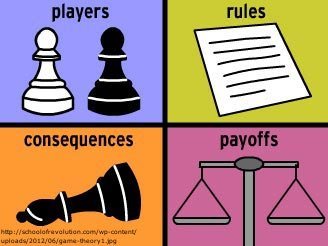Divorce & Game Theory

Game theory is the study of strategic decision making. A divorcing couple is forced to make many decisions as they go through the divorce process. Game theory models how people make decisions and handle conflict. Not surprisingly, there is a model that describes why two individuals might not cooperate even if it is in their best interests. Let’s take a look at a classic example known as the prisoner’s dilemma.
The prisoner’s dilemma is as follows:
Two men are arrested, but the police do not possess enough information for a conviction. Following the separation of the two men, the police offer both a similar deal—if one testifies against his partner (Betrayal), and the other remains silent (Cooperates/assists), the betrayer goes free and the cooperator receives the full one-year sentence. If both remain silent, both are sentenced to only one month in jail for a minor charge. If each ‘rats out’ the other, each receives a three-month sentence. Each prisoner must choose either to betray or remain silent; the decision of each is kept quiet. What should they do?
The prisoner’s dilemma can be applied to a divorce, but it must be kept in mind that there are economic and psychological consequences to a Betrayal. In a heated custody battle a parent that bad mouths the other parent does not win even if the court’s decision is the one he or she was seeking. The party will have to deal with the psychological impact of being involved in the court system and the financial impact of the associated costs.
Parties that are able to agree on custody but not on the division of assets should really think twice before deciding HOW to fight over the finances. Game theory suggests that cooperation will reduce cost and allow both parties to recover a greater share of what they seek. If you live in Massachusetts, you will be subject to M.G.L 208 Sec. 34.
Are you at the preliminary stages of your divorce? In order to get a positive outcome it is imperative to think analytically about your divorce. It is human nature to allow your emotions to stray you from taking a purely scientific approach to your divorce. If you find yourself letting your emotions affect your decision making, you should consider contacting a Massachusetts Divorce Attorney to help you reach that positive outcome that you originally sought.